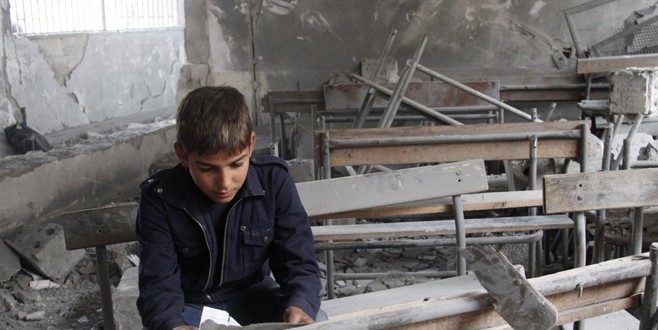International Community urged to protect education from attack in Syria
Children cannot wait for the conflict to end before there is adequate investment in their education; but the opportunity to experience the safe, quality education that is their right will also elude them unless all schools in Syria are protected.
| Suggested Reading | Conflict Background | GCCT |
By Joseph Nhan-O’Reilly
In advance of the London donor conference for Syria, a coalition of 12 non-governmental organisations with direct involvement in educational support in Syria or with Syrian refugees in the region urged governments to step up their efforts to protect students, teachers, and educational facilities in Syria from attack.
“Funding, Policy and Protection: delivering a quality education to children affected by conflict in Syria and the region” provides recommendations that the organisations say are fundamental to delivering on the promise of ensuring all children and young people affected by the conflict are in education and learning during the 2016/17 academic year.
In order to deliver on that promise we know that a combination of additional funding, policy change, and implementation, along with enhanced protection of education from attack, are all required.
In addition to recommendations related to mobilising funding and scaling up service provision to meet humanitarian needs, the call to action includes a series of recommendations that address the urgent need for all parties to the conflict to respect international humanitarian law.
In a truly tragic twist, schools have become some of the most dangerous places in Syria. Not only are they deliberately targeted, but the use of explosive weapons in populated areas, including in and around schools, results in children not going to school.
Since the conflict began, according to UNICEF more than 4,200 schools have been damaged, destroyed, militarised or are currently used as shelters by internally displaced people.
This is not a marginal issue. The number of documented cases of attacks on schools is higher in Syria than anywhere else in the world. Between 2011 and the end of 2014, the UN Secretary-General reported 8,428 attacks on schools in 25 countries, of which 52% were reported to have taken place in Syria.
The combined effect of attacks on school facilities, students, and teachers, as well as the use of schools as bases, staging posts, detention centres, and for other military purposes, has been crippling, resulting in deaths and injuries, school closures, and damage and destruction of school buildings and educational materials.
If we have any chance of giving the 2.1 million children in Syria currently out of school because of the conflict the opportunity to learn again, financial support must be accompanied by increased pressure on parties to the conflict to cease attacks on, and end the military use of, schools. Our calls on the international community detail a range of measures they can take, including urging all parties to the conflict to:
- immediately vacate the schools they are using;
- ensure that schools are safe for students to return to;
- issue orders to commanders not to use school buildings or school property, and more generally accord with the ‘Guidelines for Protecting Schools and Universities from Military Use during Armed Conflict,’ and abide by international law.
Children cannot wait for the conflict to end before there is adequate investment in their education; but the opportunity to experience the safe, quality education that is their right will also elude them unless all schools in Syria are protected.
Joseph Nhan-O’Reilly is the Head of Education Policy and Advocacy at Save the Children.
The Global Coalition to Protect Education from Attack (GCPEA) is a unique coalition of international organizations including CARA (Council for Assisting Refugee Academics), Human Rights Watch, the Institute of International Education’s Scholar Rescue Fund, Protect Education in Insecurity and Conflict, Save the Children International, the Scholars at Risk Network, UNHCR, and UNICEF.
TransConflict is an affiliated organization of the Global Coalition to Protect Education from Attack.




















RT @TransConflict: International Community urged to protect #education from attack in #Syria: Children cannot wait – https://t.co/7NkGuqRS9B
RT @TransConflict: International Community urged to protect #education from attack in #Syria: Children cannot wait – https://t.co/7NkGuqRS9B
RT @gcct_tc: International Community urged to protect #education from attack in #Syria: Children cannot wait – https://t.co/JsKyQ25Lcj
RT @gcct_tc: International Community urged to protect #education from attack in #Syria: Children cannot wait – https://t.co/JsKyQ25Lcj
RT @TransConflict: International Community urged to protect #education from attack in #Syria: Children cannot wait – https://t.co/h7jcG97q8j
RT @SwaneeHunt: RT @TransConflict: International Community urged to protect #education from attack in #Syria: Children cannot wait – https:…
International Community urged to protect education from attack in Syria https://t.co/mh4EQuGb1N #Nonprofit
RT @Aktivizmo: International Community urged to protect education from attack in Syria https://t.co/mh4EQuGb1N #Nonprofit
RT @SwaneeHunt: RT @TransConflict: International Community urged to protect #education from attack in #Syria: Children cannot wait – https:…
RT @SwaneeHunt: RT @TransConflict: International Community urged to protect #education from attack in #Syria: Children cannot wait – https:…
RT @SwaneeHunt: RT @TransConflict: International Community urged to protect #education from attack in #Syria: Children cannot wait – https:…